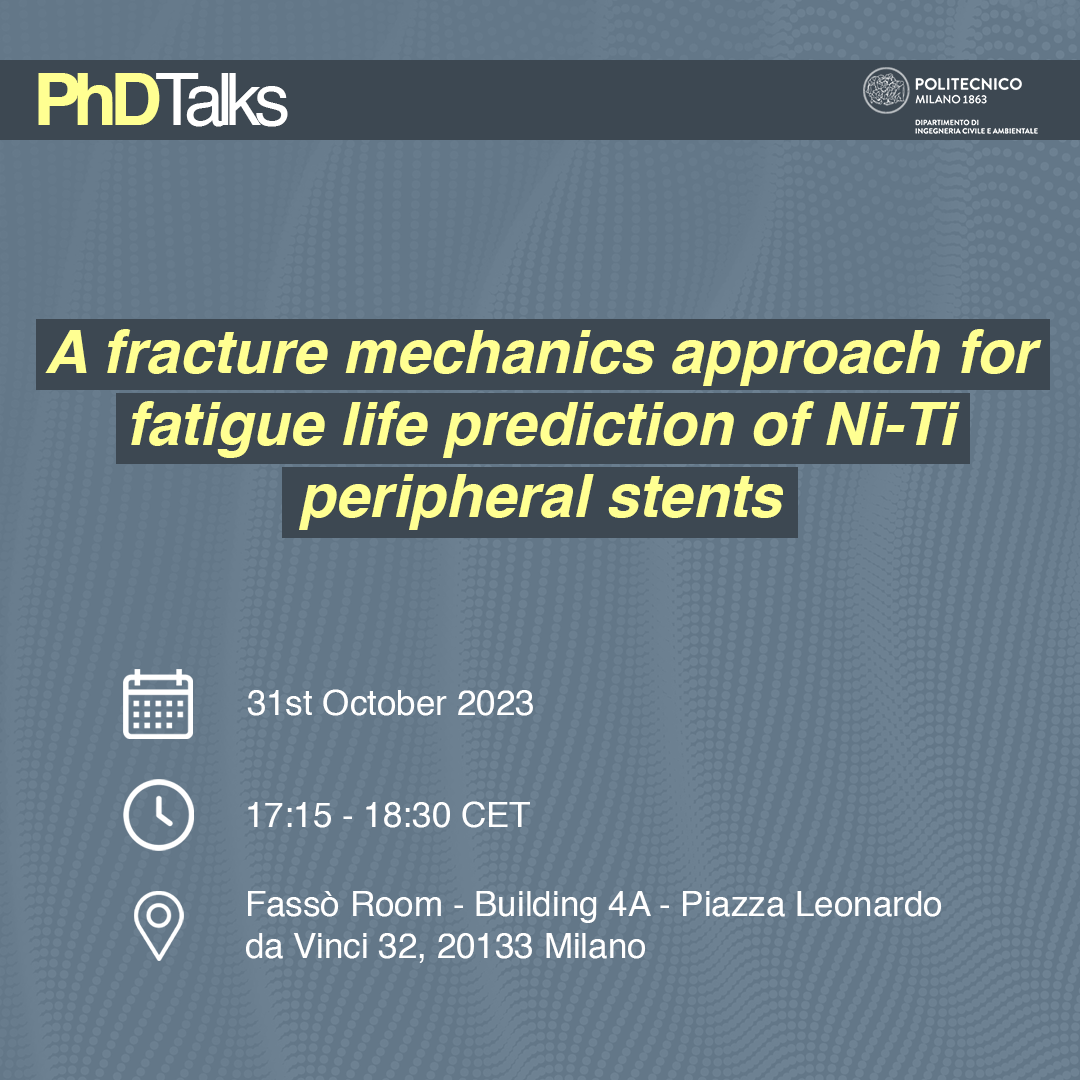
- Questo evento è passato.
PhDTalks | A fracture mechanics approach for fatigue life prediction of Ni-Ti peripheral stents
31 Ottobre 2023 @ 17:15 - 18:30

Il prossimo appuntamento con la serie di incontri PhDTalks si terrà Martedì 31 ottobre nell’aula Fassò (Edificio 4A), dalle 17:15 alle 18:30 CET.
PhDTalks è una serie di seminari e discussioni tra dottorandi. Gli eventi hanno lo scopo di fornire un luogo dove creare un network tra dottorandi ed entrare in contatto con i molti progetti sviluppati nel nostro dipartimento.
La speaker Alma Brambilla condurrà un seminario dal titolo “A fracture mechanics approach for fatigue life prediction of Ni-Ti peripheral stents”.
Al termine dell’evento sarà disponibile un piccolo rinfresco finanziato dal dipartimento.
Sarà possibile seguire la conferenza anche online al seguente link.
Abstract
Nickel-Titanium (Ni-Ti) stents are the gold standard in the mini-invasive treatment of atherosclerotic diseases affecting peripheral arteries. The fatigue fracture of these devices under in vivo cyclic loads constitutes an open issue of major concern given the severe associated drawbacks such as re-occlusion of the artery. However, the non-linear material response and the reduced dimensions of stent struts increase the complexity of their fatigue assessment, requiring ad hoc and well-defined methods. Despite many phenomenological approaches have been proposed, open questions remain and more efforts are still required to understand and predict Ni-Ti thin struts failure under fatigue loads. This work aims at investigating the application of fracture mechanics principles for stent fatigue life assessment, accounting for the propagation of pre-existing manufacturing defects. To this purpose, crack propagation tests were performed on ad hoc samples, characterized by a microstructure comparable to that of stents, to gain the material crack growth rate. A proof-of-concept study was conducted at first, performing an experimental fatigue campaign on multi-wires samples having the same dimension and material properties of stents. Fracture surfaces were inspected through a scanning electron microscope highlighting defect size at the initiation site of fracture. A crack propagation algorithm was herein calibrated, introducing the non-linear fracture mechanics energetic parameter cyclic J-integral and integrating the crack growth law from the initial defect size observed on the fracture surfaces. Finally, the same approach was adopted to predict the fatigue life of commercially-resembling stents (Fig. 1), experimentally tested under multi-axial loading conditions, exploiting finite element simulations to assess the local cyclic stress-strain response in the failure regions. In both the studied applications, promising life predictions were obtained, demonstrating the role of fracture mechanics in explaining Ni-Ti struts fatigue failure.
Speaker’s bio
Alma is a PhD student in Structural, Seismic, and Geotechnical Engineering (38th cycle) at Politecnico di Milano. She has a Master of Science in Biomedical and Mechanical Engineering obtained in 2022 at Politecnico di Milano through a Double Degree Programme.Her current research mainly addresses experimental characterization and numerical modeling of the fatigue behavior of cardiovascular devices made by Nickel-Titanium shape memory alloys, focusing on the development of integrated predictive tools to assess fracture.
In her free time, Alma enjoys hiking and reading.
